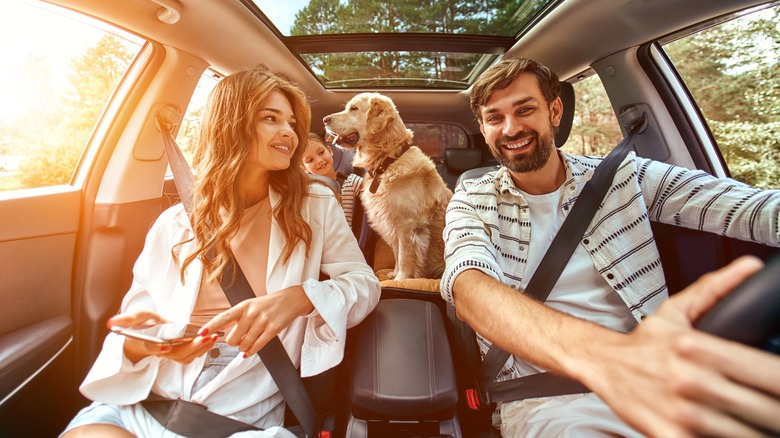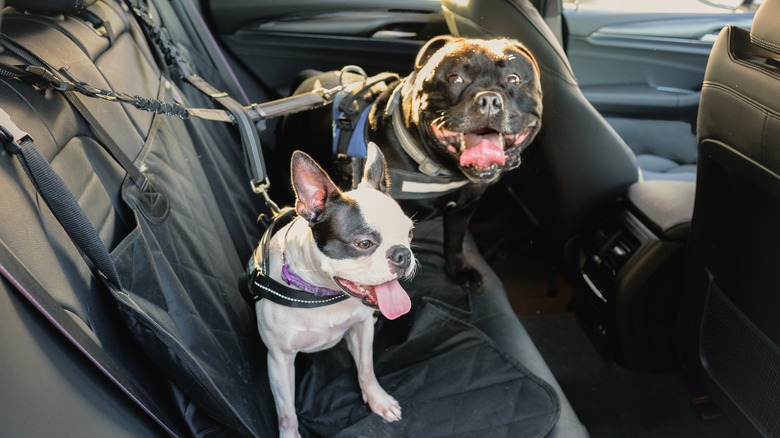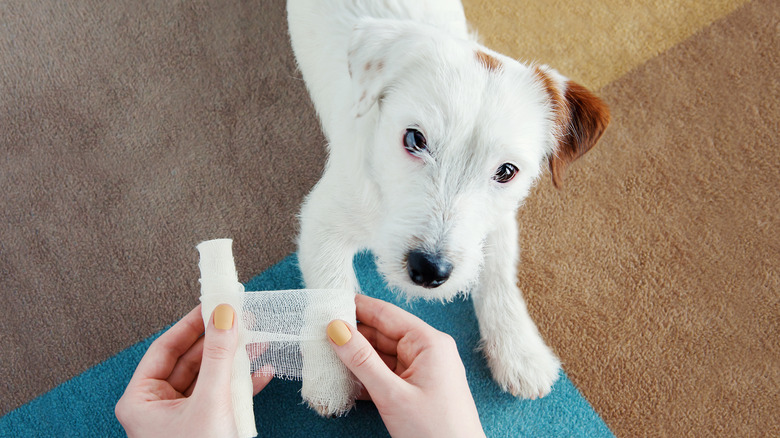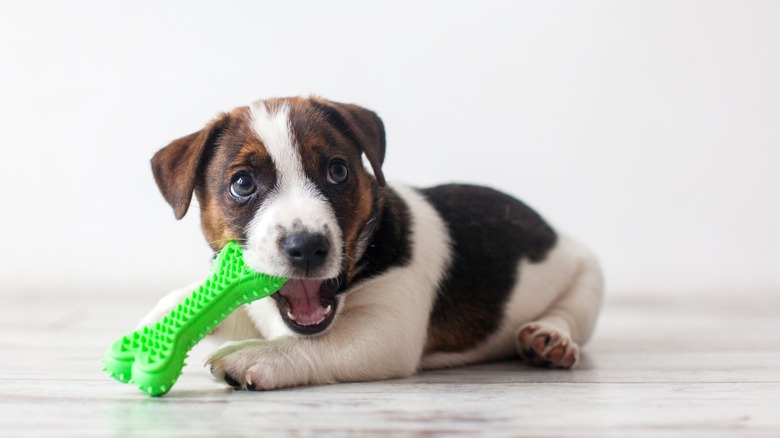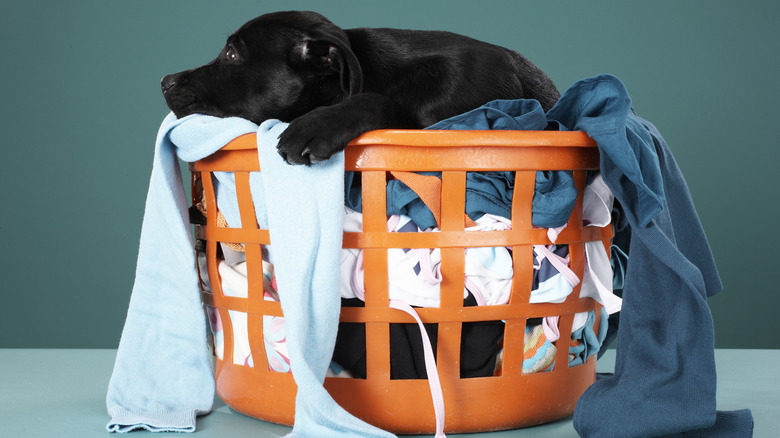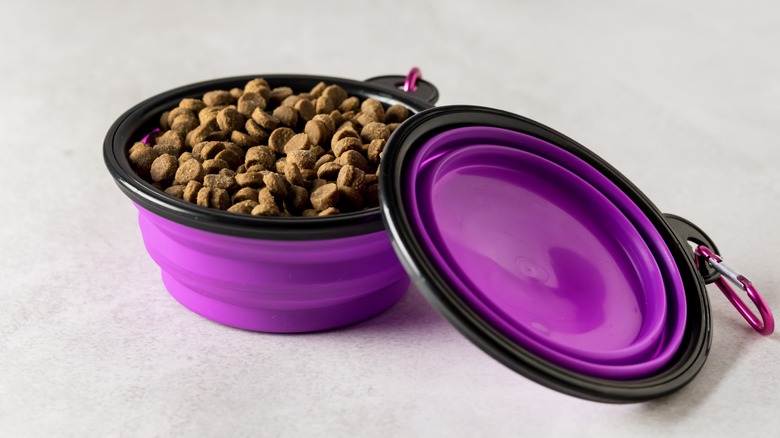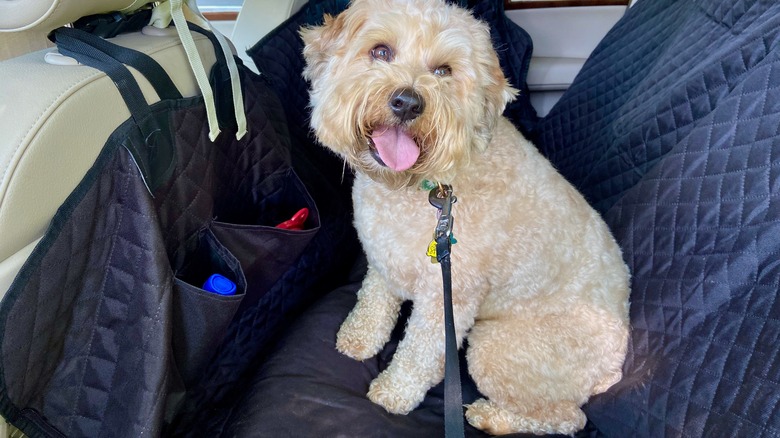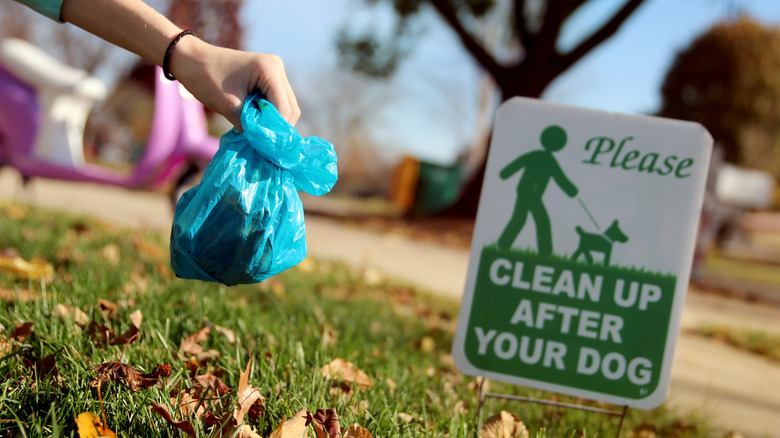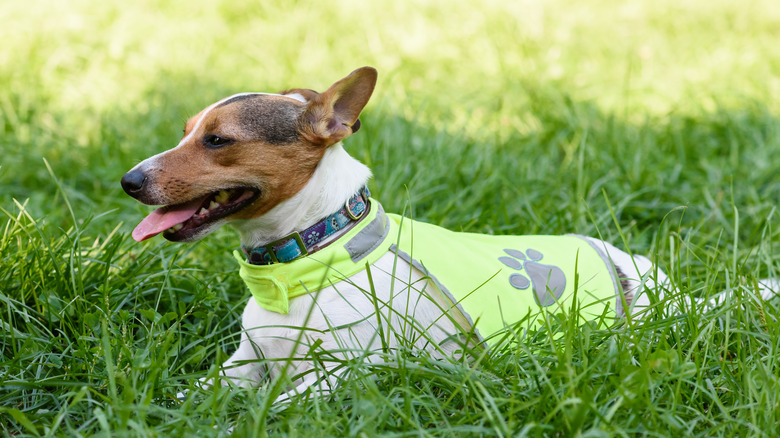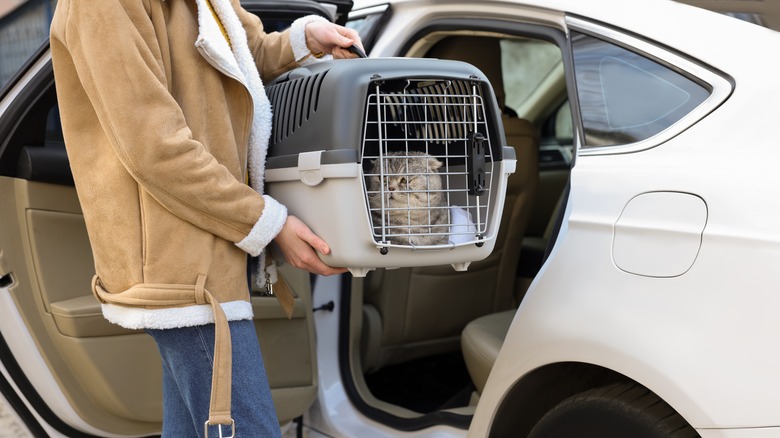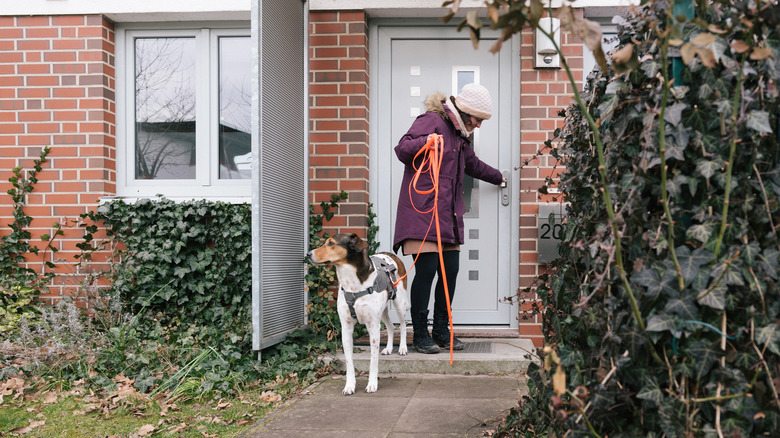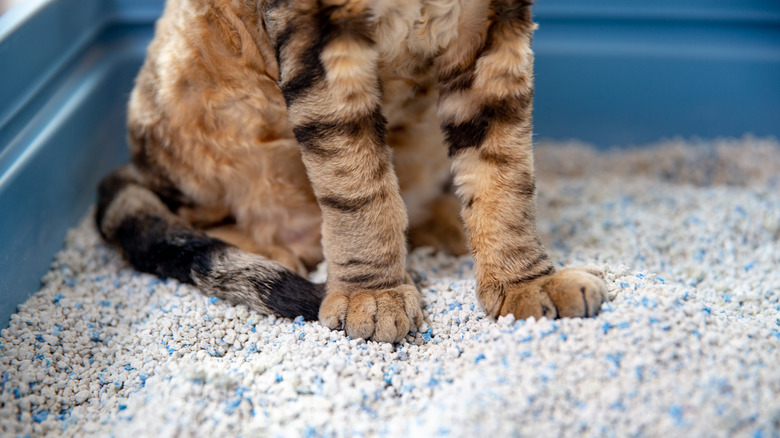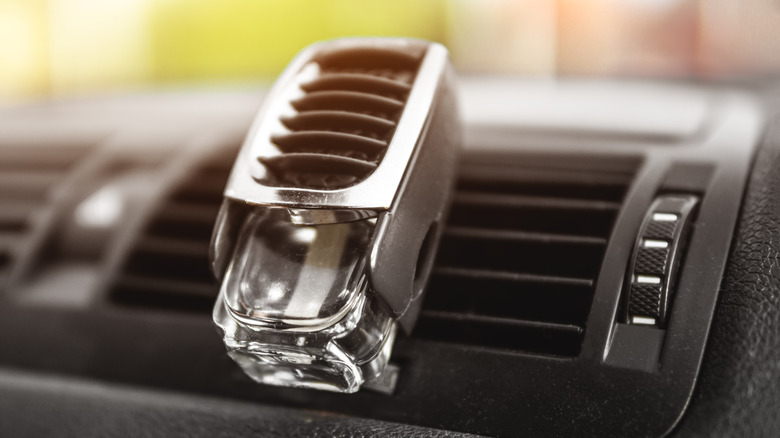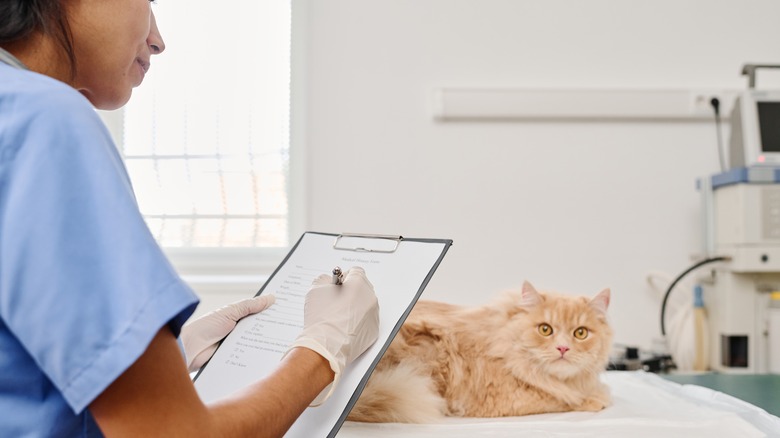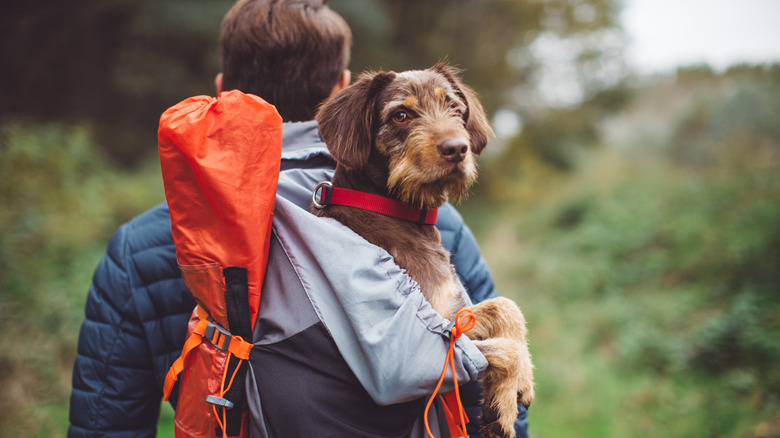Packing Hacks For Road Trips With Pets
Hitting the highway makes a true adventure out of the journey, not just the destination, and it's a fantastic way to spend time with the people you love. But some members of the family benefit even more from a road trip over other modes of travel, like your pets. They are often a welcome addition to the traveling group when setting off for a road adventure. Unlike flying with your pets, being on the road offers far fewer potential hurdles.
However, there are some additional considerations to keep in mind when bringing your dog or cat along for the journey. For starters, it's a good idea to stop every two hours or so while driving along your route. At home, your pets may not need a bathroom break very often. But in the car, not only will they need to relieve themselves more regularly, but they will also need to stretch their legs and drink more water than usual. That said, getting out some of their energy every few hours will keep your pets calm and happy throughout the trip. As with any good road trip, preparation is key.
Invest in a seatbelt harness for the backseat
Dogs, cats, or any other pets you might consider bringing along for the trip should never be in the front seat. It can be tempting to let your pal jump into the passenger seat to keep you company, especially if traveling alone. However, giving your pet free reign in the car is a recipe for disaster. In the event of an accident, your pet may be struck by the airbag if they're up in the front with you. After all, airbags are built for humans and are incredibly destructive to even large riders, so they can prove debilitating or even fatal to a much smaller animal.
Plus, allowing your pets to roam can be distracting or even create physical interference (if they try to climb onto you) that hinders your ability to drive safely. The reality is that everyone is safer and happier if your pets are contained in the rear section of the vehicle's cabin. Therefore, a harness and car leash that straps into a seatbelt or wraps around a headrest can provide this essential safety measure without introducing undue stress or discomfort for your pet.
Pack a pet-appropriate first aid kit
A first aid kit is a good idea for any car. Bandages, disinfectant wipes, and a few medications (like Tylenol or ibuprofen) are valuable things to keep with you for personal care while commuting or on a road trip. But if you're bringing your pet along for the ride, you'll need to bring a first aid kit designed specifically for their needs. Your pet will be exploring a range of new environments, and it's possible that they may cut themselves or pick up an injury while out and about. Tweezers, gauze, a flashlight, peroxide, and cornstarch (an effective tool to stop bleeding) are all must-have additions to a pet-specific first aid kit. You'll also want to speak with your vet about getting refills on any medication your furry friend might require so that you have them on hand.
It's also a good idea to bring bottled water if you're going to cross into another state so your pets aren't subjected to the minute changes in the minerality of a new community's water source. This can lead to bowel issues and discomfort. You won't want your pet to be uncomfortable while away on a grand adventure. Cleaning up the consequences of an upset stomach is a buzzkill, too.
Don't leave without your furry friend's favorite toys
Your pet is almost assuredly big on their toys. Aren't we all? Most cats and dogs have a unique set of favorite playtime goodies, and these toys act as stress relievers, relaxation tools, and energy management amenities.
Toys will help your pet stay calm and enjoy the road trip as much as you and your human travel companions. Moreover, a happy and relaxed pet is one that won't create havoc in the car, otherwise bringing down the collective mood as a result. For dog and cat owners whose pets are often rough with their toys, packing a few spares is a good idea, and giving them things that don't pose a choking hazard is a must. While driving, you won't be able to immediately reach back and take a small piece of your furry companion's latest victim out of his mouth before it ends up getting swallowed.
Bring old clothes to provide the smell of home
For dog or cat owners dealing with a bit of anxiety in their pets, a few old T-shirts can go a long way to settling a four-legged travel companion. A worn-out bed shirt doesn't seem like much to a person, but for a nervous pet, it's a reminder of the comforts of home that act as a powerful relaxation tool. The smells of their typical environment will help them cope with the bumps and turns of the road while you and the rest of your travel party enjoy the more exciting aspects of a trip away from home.
These things won't take up much space and can be tossed in with your dog or cat toys without a second thought. In order to really ramp up the value, consider wearing an old (and clean) t-shirt to bed for a few nights before embarking on your adventure. That way, the shirt will have your fresh scent for increased effectiveness.
Carry collapsible bowls and plenty of food and water
Bowls are a necessity for any variety of pet care. At home, it's best to keep a fully accessible water bowl and one or more food bowls at the ready for daily feeding times. While on the road, you're likely to see a different sort of need, however.
The best option for a road trip is the collapsible bowl. These fold down flat for easy storage and transportation. Unlike the typical bows you might use, they're made of silicone or plastic and naturally resist damage and breakage. Many of these types of bowls are also constructed with squared bottoms, allowing them to stand with a bit better stability than would otherwise be possible. This is an essential feature while traveling. If you're driving in an RV or any sort of large camper-type van, you may want or need to give your furry friend food or water while in motion. A sturdy bowl is a must-have in these and many other travel-specific situations.
Add a seat cover
A seat cover specifically designed for pets will help keep your car clean throughout the journey. These are typically made with thick nylon fabric to prevent rips and tears while offering an easier surface to wipe clean than cotton or other seat cover materials. Not only is this a durable and easy-to-use addition that will keep the interior of the car clean, but a seat cover can also be used to create a dedicated section for your pet to relax in.
Many pet-specific seat covers strap onto the headrest bars to hold the fabric in place running up the back of the seat. They also come with straps on the front end, attaching to the headrest of the seats in front of the bench row. The result is a natural U-shaped area for your pet to sit in and get comfortable. The walls created by fastening the ends in place make for a simple and effective way to contain pets in a certain part of the car. If you have the space — perhaps a third row that isn't needed for human passengers — this type of seat cover is a fantastic addition to the packing list for a pet-friendly road trip.
Poop bags, wet wipes, and stain cleaner are a must
There are bound to be a few accidents along the way. This is the norm for traveling with young children, and it's certainly a feature of road trips with pets. Bringing ample cleaning supplies along for the ride will ensure that your afternoon isn't ruined by a sudden accident in the back seat.
For dogs or cats, it's a good idea to bring lots of poop bags in the car and pack a roll somewhere that's easy to access. Whether it's a vomiting incident or your pet does, in fact, poop in the car, these small collection bags are a critical tool for cleaning up. Wet wipes and the stain cleaner you use for couches, carpets, and other upholstery will also help return the car seat or floor to its prior state. Driving with the remnants (both sight and smell) of an accident can severely hamper the mood in the car. Therefore, packing for a pet-inclusive road trip requires a few cleaning additions to keep the environment clean, pleasant, and safe.
Pack reflective gear for nighttime bathroom breaks
If you plan to drive into the night, there's a good chance your pet will need to stop for a rest and bathroom break after dark. In an unfamiliar environment with loud noises, lots of cars, and potentially poor lighting conditions, it can be easy to feel insecure about your pet's well-being. Using reflective gear or clip-on lighting attachments that dangle off a harness or collar can put you at ease, though.
Reflective augmentations are a good thing to pack, both for yourself and your pet. These will help other drivers see you in low light conditions as the sun sets and keep you visible after dark, too. Even if you only stop at gas stations and rest stops (avoiding hazardous pullovers on the highway completely), making yourself and your pet visible to others is hugely important. Most drivers on long trips aren't bringing their pets with them, so they won't be expecting you to be walking around with a dog or cat. A tired driver may not notice your pet next to you if you don't take proper precautions, leading to conditions that may end in injury or catastrophe.
Travel crates and carriers help provide comfort and stress-free pet management
Crates and carriers are an important tool for drivers taking their beloved pets along with them on the road. It's not always necessary to keep pets in these containment vessels while driving, but they can be a gigantic help when unloading the car at your destination or when arriving at the next pit stop location. A travel carrier that's the right size for your pet creates a comfortable and inviting environment. An appropriate carrier should be large enough for your pet to easily turn all the way around while inside, and it should also allow them to either curl up or completely stretch out while lying down. Add a toy or two and one of your old shirts alongside a blanket or small bed, and the crate will resemble a slice of home for your companion.
Travel carriers also make it easy to contain your pet, especially if they're prone to excitedly jumping out of the car. If every exit from the vehicle is a mad dash to grab the family dog so they don't go darting out into the parking lot, a travel crate will simplify the process tremendously and create a safety net that benefits everyone.
Pack an extra leash, and think about adding a longer training lead
Packing an extra leash is a great idea, regardless of the pet you'll be bringing along. While you're away from the familiar sights, smells, and sounds of your home environment, you'll want to keep a close eye on where your four-legged friend is exploring. The unfamiliar terrain may make them a little jumpy, so keeping a leash close at hand is an important part of the planning process.
Packing a few will give you the opportunity to leave one in a few places around the car for easy access. Wherever you choose to keep your gear, it's important to separate it from your pet unless you plan to drive with a leash still hooked to the harness. Having the lead in your hand and ready to go before you open the door is crucial to maintaining control, even under high energy or unpredictable circumstances. A long training lead is a wise option to add to the mix, as well. Not only does this give you the freedom to allow your dog or cat to roam around with a bit of extra freedom while making a routine stop, but if you get out of the car to explore a new environment, your pet will have a greater opportunity to interact with the destination, too.
A top-entry litter box is a must for cat companions
Litter boxes are an important item on the packing list for cat owners. The value of a quality litter box doesn't need to be spelled out, but a top-entry litter box, in particular, makes life easier for cat owners taking their pets on the road.
Litter boxes accessed from above help control the spread of litter while your cat is doing its business. Unwalled boxes or those with front flaps won't prevent the spray of errant litter, but this type of entryway layout does offer some protection. Anything you can do to keep the small space clean and neat goes a long way to making the road trip more pleasant for everyone involved. Whether you're in a large van with the litter box sitting out or plan to set it down on the ground during stops along the way, these models are easier to move around and offer a natural guard against flying litter.
Pack a few air fresheners for the car
If you'll be exploring the great outdoors — or stopping at rivers, lakes, or beaches on your travels — then your dog or cat may bring a new, pungent odor along for the ride. Wet pets that have been romping around in nature may be covered in mud or sand, and they often quickly become a bit musty smelling. There's a reason why the "wet dog smell" is a universally understood concept, even for those who don't own pets. After a particularly adventurous pit stop, you may not have the facilities to fully clean your dog or cat before putting them back in the car. This is where air fresheners and other air purification and odor-eliminating tools come into play.
Packing a few simple air fresheners in the car is a great way to mitigate the impact of a wet pet's odor. While Febreze sprays and other gadgets might improve things even more, extra air fresheners that clip into the vents or hang from the mirror can go a long way in a pinch.
Bring along your pet's vet record
No one expects to run into a medical emergency, but the reality is that an injury or illness can occur at any time. Human travel companions can communicate with one another clearly, articulating the issue to create a plan to remedy the moment of crisis. When it comes to your pets, though, it can be challenging to make sense of what's wrong. When planning a road trip with pets, it's always important to look for emergency vet services at your destination and perhaps even along the route you'll be taking.
Even more importantly, you'll need to pack the vet records for your pet, just in case they're required when searching for accurate treatment. An emergency vet can do great things to help comfort your loved one and nurse them back to health, but these professionals start at a serious disadvantage if they don't have any medical context for creating a treatment plan. Your pet's vet record can illuminate any potential underlying issues, give details on recent medications and vaccines, and much more. Time is of the essence in an emergency, and taking care of this little detail can make all the difference when it counts.
Get a dog or cat carry bag to bring your friend everywhere you go
A carry bag that your pet can sit in will allow you to bring them anywhere you go without worrying about keeping them on their best behavior or managing leashes and the energy requirement out of their small feet. Many road trippers are avid hikers or campers, seeking the marvels of the natural world that lie out there waiting to be explored. Tackling long-distance hiking trails, climbing mountains, or endlessly walking beaches can be tiring for pets, especially smaller ones.
The carry bag that lets you strap your dog or cat to your shoulders makes for an easy way to bring your pet along for these adventures while retaining the ability to continue wandering long after their little legs become tired. You're also sure to get a good few photos with your furry friend, and we all know that photos of pets and social media are a match made in heaven.
